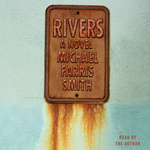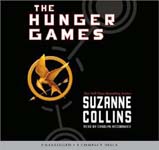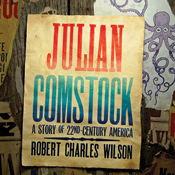
 The Girl in the Road
The Girl in the Road
By Monica Byrne; Read by Dioni Collins and Nazneen Contractor
Publisher: Random House Audio
Publication Date: 20 May 2014
[UNABRIDGED] – 11 hours, 7 minutes
Themes: / fantasy / near-future / dystopia / road trip / Ethiopia / Djibouti / India / ocean / metallic hydrogen /
Publisher summary:
In a world where global power has shifted east and revolution is brewing, two women embark on vastly different journeys—each harrowing and urgent and wholly unexpected.When Meena finds snakebites on her chest, her worst fears are realized: someone is after her and she must flee India. As she plots her exit, she learns of The Trail, an energy-harvesting bridge spanning the Arabian Sea that has become a refuge for itinerant vagabonds and loners on the run. This is her salvation. Slipping out in the cover of night, with a knapsack full of supplies including a pozit GPS system, a scroll reader, and a sealable waterproof pod, she sets off for Ethiopia, the place of her birth.
Meanwhile, Mariama, a young girl in Africa, is forced to flee her home. She joins up with a caravan of misfits heading across the Sahara. She is taken in by Yemaya, a beautiful and enigmatic woman who becomes her protector and confidante. They are trying to reach Addis Abba [sic], Ethiopia, a metropolis swirling with radical politics and rich culture. But Mariama will find a city far different than she ever expected—romantic, turbulent, and dangerous.
As one heads east and the other west, Meena and Mariama’s fates are linked in ways that are mysterious and shocking to the core.
This book defied my expectations at every turn. It is near-future but in two different times and locations. Mariama is in a caravan heading to Ethiopia across land, and Meena is heading to Ethiopia from India, across the Arabian Sea, on a floating road made of metallic hydrogen. Interesting concepts for the near-future, and nice to have African and Indian characters and settings. The writing is my type – emotional, internal dialogue, pondering greater meanings.Everyone keeps calling it sci-fi, I imagine because of the brief technology mentions, but I think it fits more in fantasy – people who may or may not be human/gods/ghosts, the quest/journey, the lesson, the good vs. evil, the superhuman moments – feels like fantasy to me! The cover also claims the book is like a hybrid of Neil Gaiman, Erin Morgenstern, and Margaret Atwood. I don’t see Gaiman or Morgenstern except for fantasy, but that is a pretty broad paintbrush, one that seems to grasp at the most popular authors in a genre that has better examples to draw from. Atwood maybe in the sense of timeline and natural disaster themes. Otherwise, I see this more like the fantastical imaginings of J.G. Ballard (such as The Unlimited Dream Company) with the setting and world building of Nnedi Okorafor (Who Fears Death?). So if we have to compare it to something, let it be those two instead.
I want everyone to read this book so we can discuss the ending. I listened to the last disc three times because I’m not entirely sure what happened. I’m still not. I have questions that will make no sense until you’ve read it. Questions like, “Where is Djibouti?” and “Is everyone insane?” I keep telling friends about the book and thinking about it, and it has one of the few five-star ratings I’ve given out in GoodReads so far this year. A week after finishing, I got into a conversation about metallic hydrogen and man-made floating islands in Facebook because a person had posted about Kiribati, a nation that is destined to disappear into the ocean. Their leader is seriously considering building a place to keep his people together, because what else can you do if your country slips beneath the sea? Monica Byrne touches on this same question.
The two readers, Dioni Collins and Nazneen Contractor, do a brilliant job in the performance of this book, particularly in the slipping between India and Africa the way any immigrant would, and that is crucial to the character of Meena.
Posted by Jenny Colvin
 Rivers
Rivers


 State Of Fear
State Of Fear